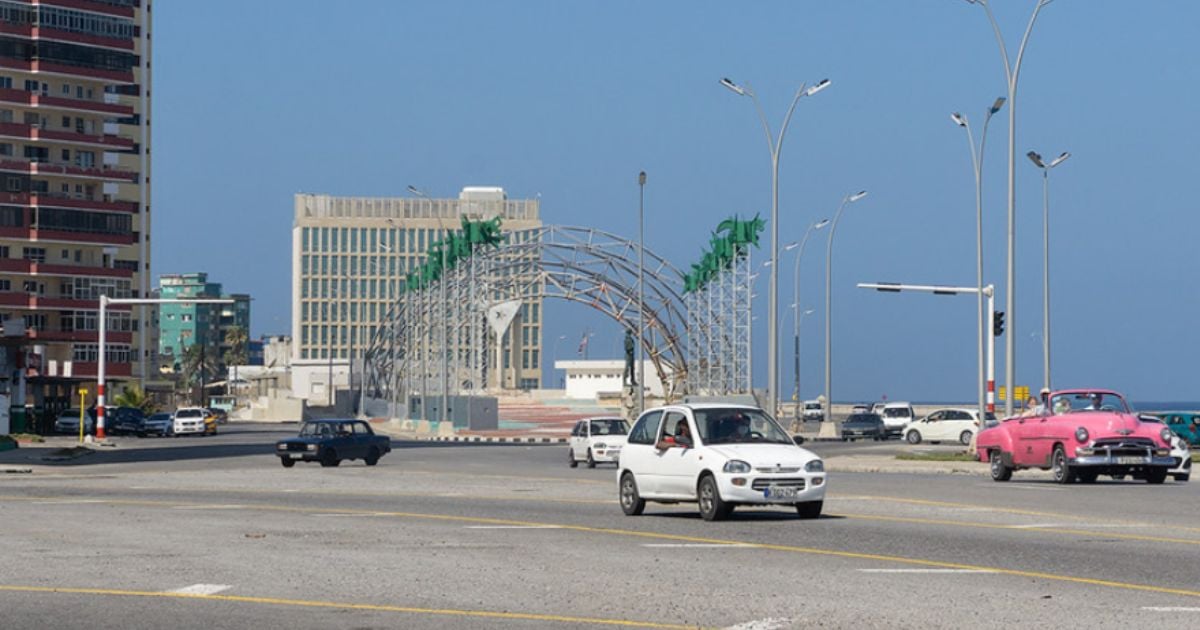Shortly after the pro-government website Cubadebate published a sponsored announcement that the José Martí Anti-Imperialist Platform, located in front of the U.S. Embassy in Havana, could be rented for "parties, meetings, fairs, and events of all kinds" for up to 28,000 CUP per day, the notice was pulled down. This move has sparked questions on whether the Cuban regime reconsidered its decision or is quietly revising its proposal.
The removed content, initially published as "sponsored content," stated that the iconic venue was open for rental to both individuals and organizations for "cultural, political, educational, sports, and similar activities." Given its role as a symbol of the regime's ideological discourse during the Battle of Ideas, the announcement ignited a storm on social media.
Government Response to Public OutcryIn response to the uproar, Pedro Lizardo Garcés Escalona, president of the Rampa Popular Council in the Plaza de la Revolución municipality, took to Facebook to clarify the situation, though he did not mention Cubadebate directly. He noted that some reports inaccurately suggested the Platform was "up for auction or sale," which he described as a misguided interpretation of the discussions.
Garcés explained that the Platform has long sought economic sustainability solutions due to marine environment damage and state budget constraints. In this context, it was proposed to rent out three indoor halls for meetings or events for state institutions, which were previously offered for free despite these entities having budgets for such purposes.
He emphasized that there was "never" any discussion about altering the Platform's foundational political and social purpose, asserting that any rental agreements would not interfere with pre-scheduled community or political activities. "The Platform will not be leased for private interests that deviate from its original purpose or do not contribute to the culture of this nation," Garcés stated, reinforcing that the founding principles "will not be violated."
Backlash and DenialsIn previous Facebook posts, Garcés publicly refuted a Cubadebate story about the commercial rental of the José Martí Anti-Imperialist Platform. “It will remain a space of denunciation for our people... I deny what has been reported about its rental and assure that it will continue to be the platform of Fidel and the Cuban people. We remain in combat!” he wrote on Facebook.
The local leader, whose jurisdiction includes the symbolic site, reacted strongly to the promotional note published by the official portal, directed by journalist Randy Alonso, with whom Garcés recently met to discuss "dedication, homeland, and the lessons of the undefeated," according to his own words.
The removal of the announcement from Cubadebate, without any official clarification, leaves open the question of whether there was a forced retraction following public criticism or if it was merely a containment maneuver in response to the backlash.
From Political Symbol to Rental VenueThe initial announcement, branded as sponsored content on Cubadebate, suggested that the José Martí Anti-Imperialist Platform was available for rental by individuals and legal entities as part of the "regulatory updates of the economic policy" in the current 2025. The text justified this decision as a way to maintain "the legacy of its foundational principles" through more functional use of the space, considering the challenging economic conditions for maintaining public infrastructures.
The site, which for years hosted ideological reaffirmation acts, mass gatherings, and political concerts, was offered for private presentations, corporate meetings, workshops, or institutional parties. Among the offerings were a climate-controlled hall accommodating 100 people for 13,741.29 CUP daily, and two protocol rooms, one for 50 people and another for 20, each priced at 15,543 CUP daily.
Outdoor spaces were also offered for nighttime events for up to 120 people, costing 28,000 CUP per day. Additionally, the complex's socio-administrative building offered offices for rent, with monthly rates calculated at 340 CUP per square meter. For instance, a 6x6 meter office cost 12,240 CUP monthly, and a 3x3 meter one, 3,060 CUP.
Silent Removal and Growing Criticism: "Ashamed of Their Own Incompetence"
The quiet removal of the post led to a wave of reactions on social media, where activists and citizens questioned the lack of transparency and consistency in the official narrative. Activist Magdiel Jorge Castro wrote on Facebook: "Cubadebate deletes the news about the rental of the Anti-Imperialist Platform, and several officials claim that the offer does not exist... heads are rolling today. They are ashamed of their own incompetence."
In another post, Castro shared an AI-generated cartoon featuring the phrase "For Rent-ed," referring to the removal of the controversial announcement. The image displayed the iconic flag of the Anti-Imperialist Platform alongside the message "404 - page not found," alluding to the typical error of deleted internet content.
With irony, the illustration highlighted the contradiction between the regime's ideological discourse and the commercial practice briefly revealed by Cubadebate. Other reactions took a sarcastic tone, such as Yaiset Rodríguez Fernández's post on Facebook: “—Hello, is this the Anti-Imperialist Platform? —Yes, what can I do for you? —I want to celebrate my daughter's quinceañera. But look, can we decorate with the things her aunt from Miami sent, right? Oh, oh... seems like the call dropped.”
This post alluded to the absurdity of renting a political symbol for private celebrations and the inconsistency of the official discourse with the country's economic and social reality.
Questions about the Anti-Imperialist Platform Controversy
Why was the rental announcement for the Anti-Imperialist Platform removed?
The announcement was removed amid public outcry and criticism, raising questions about whether the Cuban regime reconsidered the decision or was trying to mitigate backlash.
What was the proposed use for the Anti-Imperialist Platform?
The proposal included renting out the Platform for cultural, political, educational, and sports activities, and even for private events, as a way to sustain its economic viability.
What was the public's reaction to the rental proposal?
The proposal sparked significant backlash and ridicule on social media, with many questioning the regime's consistency and transparency.
